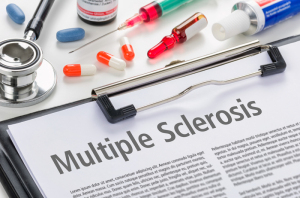Patients treated early with MS drugs are 33 percent less likely to get disease: study
by Lauren Dubinsky, Senior Reporter | August 11, 2016
Alzheimers/Neurology
Population Health
Risk Management

There were limitations
to the research
to the research
Starting treatment early for multiple sclerosis (MS) in patients who show the beginning symptoms affects the long-term course of the disease, according to a study recently published in the online issue of the journal, Neurology.
Researchers at the University Hospital Basel in Switzerland recruited 468 patients who experienced an episode that may indicate MS such as numbness, vision problems or balance problems. MR scans of the patients also showed signs of possible MS.
As many as 85 percent of people in that position, which is referred to as "clinically isolated syndrome", will eventually be diagnosed with MS. The researchers were determined to find out if early treatment had any effect on that.
The study participants were randomly assigned to either receive early treatment with interferon beta-1b or a placebo. After they were diagnosed with MS or after two years, those taking the placebo switched to interferon beta 1-b or a different drug.
After 11 years, 278 patients were still participating in the study — 167 in the early treatment group and 111 in the delayed treatment group. The findings revealed that those who received early treatment were 33 percent less likely to be diagnosed with MS than the other group.
In addition, those in the early group had more time before their first relapse — 1,888 days compared to 931 for the delayed treatment group. The early group also had a lower overall yearly relapse rate of 0.21 compared to 0.26 for the delayed group, which equated to 19 percent lower.
However, there wasn’t any difference between the two groups with regard to the tests that measured overall disability or the MR scans that measured the degree of damage caused by the disease.
The researchers were transparent about the limitations of the study. The participants and researchers found out after the fifth year which participants received the drug and which received the placebo, and there was no untreated control group after the placebo-control phase of the study was over.
Researchers at the University Hospital Basel in Switzerland recruited 468 patients who experienced an episode that may indicate MS such as numbness, vision problems or balance problems. MR scans of the patients also showed signs of possible MS.
As many as 85 percent of people in that position, which is referred to as "clinically isolated syndrome", will eventually be diagnosed with MS. The researchers were determined to find out if early treatment had any effect on that.
The study participants were randomly assigned to either receive early treatment with interferon beta-1b or a placebo. After they were diagnosed with MS or after two years, those taking the placebo switched to interferon beta 1-b or a different drug.
After 11 years, 278 patients were still participating in the study — 167 in the early treatment group and 111 in the delayed treatment group. The findings revealed that those who received early treatment were 33 percent less likely to be diagnosed with MS than the other group.
In addition, those in the early group had more time before their first relapse — 1,888 days compared to 931 for the delayed treatment group. The early group also had a lower overall yearly relapse rate of 0.21 compared to 0.26 for the delayed group, which equated to 19 percent lower.
However, there wasn’t any difference between the two groups with regard to the tests that measured overall disability or the MR scans that measured the degree of damage caused by the disease.
The researchers were transparent about the limitations of the study. The participants and researchers found out after the fifth year which participants received the drug and which received the placebo, and there was no untreated control group after the placebo-control phase of the study was over.
You Must Be Logged In To Post A CommentRegisterRegistration is Free and Easy. Enjoy the benefits of The World's Leading New & Used Medical Equipment Marketplace. Register Now! |
|









